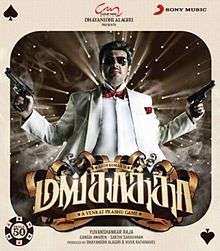Vilaiyaadu Mankatha
| "Vilaiyaadu Mangatha" | ||||
|---|---|---|---|---|
 Original CD Cover | ||||
| Single by Yuvan Shankar Raja | ||||
| from the album Mankatha | ||||
| B-side |
"Dia Dia Dole" "Goa" "Yogi Yogi Thaan" "Theeradha Vilaiyattu Pillai" | |||
| Released | 20 May 2011 | |||
| Format | CD single, digital download | |||
| Recorded | 2010-11 | |||
| Label | Sony Music Entertainment | |||
| Writer(s) |
Gangai Amaren Sucharita (Hindi) Yuvan Shankar Raja (English) | |||
| Producer(s) | Yuvan Shankar Raja | |||
| Yuvan Shankar Raja singles chronology | ||||
| ||||
"Vilaiyaadu Mankatha" (Tamil: விளையாடு மங்காத்தா; English: Play Mankatha) is a song by Indian artist and film composer Yuvan Shankar Raja. A part of the soundtrack album to the Tamil film Mankatha, it was released as a single track on 20 May 2011.[1] The song was performed by Ranjith, Premgi Amaren, Sucharita and Anitha along with Yuvan Shankar Raja, while Gangai Amaren, Sucharita and Yuvan Shankar Raja penned the lyrics in Tamil, Hindi and English, respectively.
Background
A teaser the song was released on Ajith Kumar's birthday, on 1 May 2011 on YouTube,[2][3] after plans of releasing the film or the soundtrack on that day had failed.[3] As the teaser garnered high response and became a success within few days, Venkat Prabhu and Dayanidhi Azhagiri decided to launch the complete version of the song as a single separately ahead of the complete soundtrack album.[4]
Bonus tracks
Four songs were included as bonus tracks to the single release of "Vilaiyaadu Mankatha", all of which were part of earlier soundtracks by Yuvan Shankar Raja and were marketed by Sony Music Entertainment. The four songs - "Dia Dia Dole" performed by Suchitra for the film Avan Ivan, "Goa" from the same-titled film featuring vocals by Krish, Ranjith, Tanvi Shah, Suchitra, Chynk Showtyme and Pav Bundy, "Yogi Yogi Thaan" from Yogi sung by Blaaze and Neha Bhasin and the title track from Theeradha Vilaiyattu Pillai rendered by Andrea Jeremiah, Tanvi Shah, Vinaitha and Ranjith - were added in their original composition without any variation.[5]
Track list
- "Vilaiyaadu Mankatha" – 6:02
- "Dia Dia Dole" – 4:02
- "Goa" – 4:40
- "Yogi Yogi Thaan" – 3:56
- "Theeradha Vilaiyattu Pillai" – 4:55
Production
"Vilaiyaadu Mankatha" song has been performed by Ranjith, Premgi Amaren, Sucharita and Anitha along with Yuvan Shankar Raja, while Gangai Amaren, Sucharita and Yuvan Shankar Raja penned the lyrics in Tamil, Hindi and English, respectively. The song was orchestrated and arranged by Yuvan Shankar Raja, recorded, mixed and mastered by M. Kumaraguru Paran, while Karthi and V. Subhaiah was the program manager and program co-ordinator, respectively.
Music video
The video was shot in Bangkok in a club called ‘Club Hollywood’ for four consecutive days, featuring Ajith Kumar, along with dancers from Mumbai and Bangkok, while it was choreographed by Kalyan Kumar. A lot of the crowd, featuring in the music video are the people who actually visited the club during the shoot, giving it a more ‘reality’ feel.[6]
This hip-hop song is Ajith's introduction track in the film. The song already released a couple of months before the album release and has become a hot favourite for many. It is based in a club and gives a nightlife feel. Yuvan has lent the base voice for this song, and the other singers for this track include Anitha, Premgi Amaren, Ranjith and Sucharitha. A trumpet sound is what that indicates the arrival or a celeb or a king and this song has utilized that catchy tune to introduce Ajith.
Release
Director Venkat Prabhu was determined to launch the soundtrack in an innovative way. He revealed that he would just release one song in the digital medium, so that it can be used for ring tones and caller tunes.[8] The single release would cost ₹ 49 and will come with a poster signed by Ajith Kumar himself. Unlike a usual signature where a lead actor signs one poster and the rest are digitalized, Ajith Kumar reportedly signed all the 5000 posters by himself in three days.[6] Yuvan Shankar Raja had handed over the Master recording on 11 May 2011,[9] while the single track released on 20 May 2011.
References
- ↑ Mankatha Music Release On May 20 - Mankatha - Ajith - Trisha - Venkat Prabhu - Tamil Movie News - Behindwoods.com
- ↑ Ajith plays Vinayak in Mankatha
- 1 2 IndiaGlitz - ‘Mankatha’ teaser song byte released! - Tamil Movie News
- ↑ IndiaGlitz - Get ready for ‘Mankatha’ song - Tamil Movie News
- ↑ Mankatha (Single) book - Audio CD + AJITH’s PERSONALLY Autographed poster - Sony Music Publications | 600024.com Store
- 1 2 IndiaGlitz - Ajith’s Signs 5000 ‘Mankatha’ Posters, Literally! - Tamil Movie News
- ↑ IndiaGlitz - The wait is over for 'Mankatha' - IG's exclusive tidbits on each song - Tamil Movie News
- ↑ Just one song of Mankatha | Deccan Chronicle Archived May 14, 2011, at the Wayback Machine.
- ↑ Mankatha Single Is Ready! - Ajith - Mankatha - Venkat Prabhu - Dayanidhi Alagiri - Tamil Movie News - Behindwoods.com